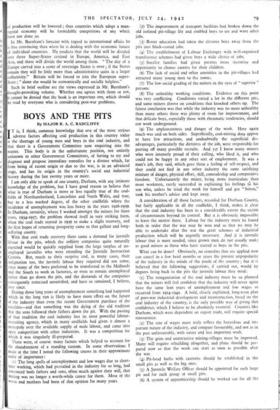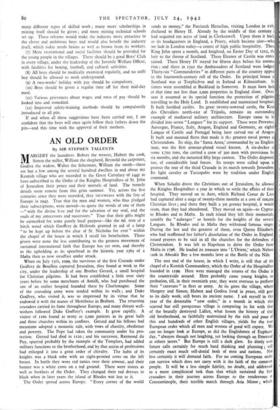BOYS AND THE PITS
By MAJOR R. A. C. RADCLIFFE
is, I think, common knowledge that one of the most serious
adverse factors affecting coal production in this country today is the shortage of young men and boys in the coal industry, and that there is a Government Committee now enquiring into the matter. This body is in the unfortunate position, not entirely unknown to other Government Committees, of having to try and diagnose and propose immediate remedies for a disease which, far from being of recent origin or due to the war, is in an advanced stage, and has its origin in the country's social and industrial history during the last twenty years or more.
I am only able to speak of one county, Durham, with any intimate knowledge of the problem, but I have good reason to believe that what is true of Durham is more or less equally true of the coal- fields of Northumberland, Lancashire and South Wales, and true, but to a less marked degree, of the other coalfields where the incidence of unemployment was less heavy in the years 1926-1939. In Durham, certainly, where I worked amongst the miners for three years, 1934-1937, the problem showed itself in very striking form, when the coal trade started in 1936 to make a slight recovery, and the first hopes of returning prosperity came to that gallant and long- suffering county.
ith that coal trade recovery there came a demand for juvenile labour in the pits, which the colliery companies quite naturally expected would be quickly supplied from the large surplus of un- employed juvenile's who were attending the Juvenile Instruction Centres. But, much to their surprise and, in many cases, their indignation too, the juvenile labour they required did not come, since many of the boys preferred to be transferred to the Midlands and the South to work m factories, or even to remain unemployed rather than go down the pits, and the demands of the companies consequently remained unsatisfied, and have so remained, I believe, ever since.
During those long years of unemployment something had happened which in the long run is likely to have more effect on the future of the industry than even -the recent Government purchase of the royalties—and that something was the dying of the old tradition that the sons followed their fathers down the pit. With the passing of that tradition the coal industry lost its most powerful labour- recruiting agency, which in many coalfields had given it almost a monopoly over the available supply of male labour, and came into open competition with other industries. It was a competition for which it was singularly ill-prepared.
There were, of course, many factors which helped to account for the abandonment of a standing custom. In some observations I made at the time I noted the following causes in their approximate order of importance: (I) The long spells of unemployment and low wages due to short- time working, which had prevailed in the industry for so long, had convinced both fathers and sons, often much against their will, that mining was no longer a worth-while career for them. Most of the Wives and mothers had been of that opinion for many years.
(2) The improvement of transport facilities had broken down the old isolated pit-village life and enabled boys to see and want other jobs.
(3) Better education had taken the cleverer boys away from the pits into black-coated jobs.
(4) The establishment of Labour Exchanges with well-organised transference schemes had given boys a wide choice of jobs.
(5) Smaller families had given parents more incentive and opportunity to choose careers for their children.
(6) The lack of social and other amenities in the pit-villages had attracted many young men to the towns.
(7) The low social grading of the miners in the eyes of " superior " persons.
(8) The unhealthy working conditions. Evidence on this point was very conflicting. Conditions varied a lot in the different pits, and some miners throve on conditions that knocked others up. The fairest conclusion was that while the industry was no more unhealthy than many others there was plenty of room for improvement, and that delicate boys, especially those with rheumatic tendencies, should not work underground.
(9) The unpleasantness and danger of the work. Here again much was said on both sides. Superficially, coal-mining does appear to have few attractions, and undoubtedly the superficial dis- advantages, particularly the dirtiness of the job, were responsible for putting off many possible recruits. And yet I knew many miners who were intensely proud of their calling, who liked it, and who could not be happy in any other sort of employment. It was a man's job, they said, which gave them a feeling of self-respect, and they could not find in any other industry the same satisfying mixture of danger, physical effort, skill, comradeship and comparative freedom. Unfortunately the miner, being more inarticulate than most workmen, rarely succeeded in explaining his feelings to his son who, unless he tried the work for himself and got " bitten," took his mother's advice and kept away.
A consideration of all those factors, recorded for Durham County, but fairly applicable in all the coalfields, I think, makes it clear that the coal industry has been to a considerable extent the victim of circumstances beyond its control. But it is obviously impossible to leave the matter there. Labour for the industry must be found both in order that the war may be won and so that we may be able to undertake after the war the great schemes of industrial production which will be urgently necessary. And it is juvenile labour that is most needed, since grown men do not usually make as good miners as those who have started as boys in the pits.
What can be done? Obviously, no remedies that are applied now can cancel in a few brief months or years the present unpopularity of the industry in the minds of the youth of the country ; but it is believed that the following suggestions, if carried out, would by degrees bring back to the pits the juvenile labour they need : (t) The reorganisation of the coal industry must be so planned that the miners will feel confident that the industry will never again have the same lean years of unemployment and low wages as occurred from 1924-1940. A bold, clearly explained, long-term plan of post-war industrial development and reconstruction, based on the coal industry of the country, is the only possible way of giving this confidence, which I believe to be absolutely essential. Counties like Durham, which were dependent on export trade, will require special reassurance.
(2) The rate of wages must truly reflect the hazardous and im- portant nature of the industry, and compare favourably, and not as in the past unfavourably, with easier and less important work.
(3) The grim and unattractive mining-villages must be improved. Many will require rebuilding altogether, and plans should be pre- pared now so that the work can start as soon as possible after the war.
(4) Pit-head baths with canteens should be established in the small pits as well as the big ones.
(5) A Juvenile Welfare Officer should be appointed for each large pit and for each group of small pits.
(6) A system of apprenticeship should be worked out for all the many different types of skilled work ; many more scholarships in mining itself should be given ; and more mining technical schools set up. These reforms would make the industry more attractive to the clever and ambitious boys and would also benefit the industry itself, which today needs brains as well as brawn from its workers.
(7) More recreational and social facilities should be provided for the young people in the villages. There should be a good Boys' Club in every village, under the leadership of the Juvenile Welfare Officer, with facilities for boxing, football, and cultural activities.
(8) All boys should be medically examined regularly, and no unfit boy should be allowed to work underground.
(9) A two-weeks' holiday with pay should be compulsory.
(to) Boys should be given a regular time off for their mid-day meal.
(I1) Various grievances about wages and rates of pay should be looked into and remedied.
(12) Improved safety-training methods should be compulsorily introduced to all pits.
If and when all these suggestions have been carried out, 1 am confident that the boys will once again follow their fathers down the pits—and this time with the approval of their mothers.



























 Previous page
Previous page